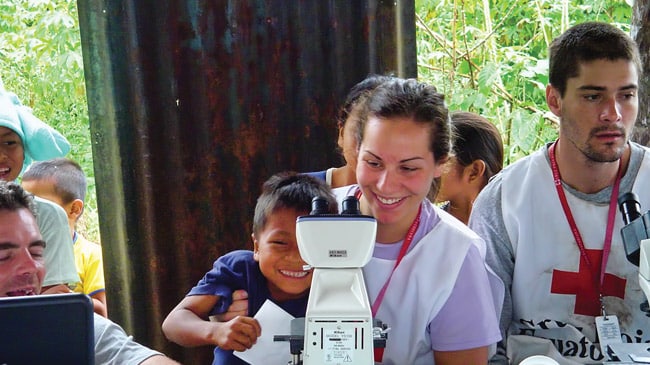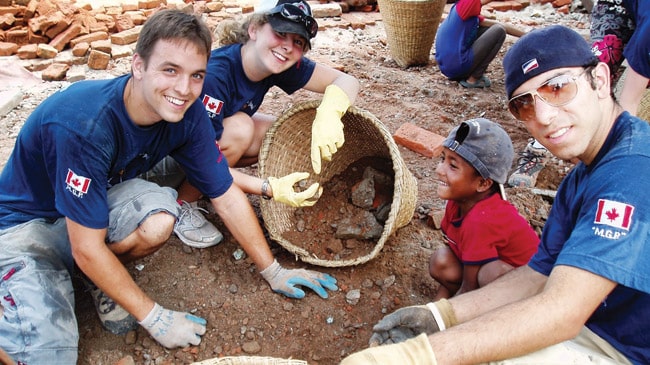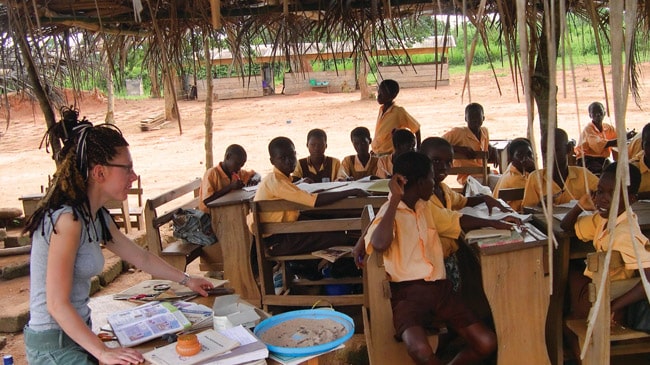Over the last decade short-term international volunteering has exploded in popularity. This is a testament to the willingness of today’s youth to get involved and play an active role in addressing many of the world’s most pressing challenges. Along with this rise in popularity, however, has come considerable criticism of both the effectiveness of international volunteering in general, and the potential for volunteering to do more harm than good. This criticism is not unfounded. A poorly managed volunteer placement can be of little value and in extreme cases, can cause considerable damage. When these risks are mitigated, though, international volunteering can have a valuable impact not only in the work that volunteers do on their placement but well after a volunteer has returned home.
It has been said by many that the work of short term volunteers is not sustainable. For an independent volunteer working as a team member in a supportive role with a local organization, however, this argument is not particularly relevant. While it is true that this type of volunteer work provides only sporadic assistance, it can allow the organization to complete projects more quickly and to initiate new projects.
Sustainability is an ongoing challenge on group based infrastructure projects. To be sustainable, it is critical to ensure both community management and commitment to the project. There are countless examples of foreign volunteers and organizations building schools, toilets and other infrastructure that remain unused shortly after the volunteers depart. This is primarily because these types of projects often raise the funds to build the infrastructure but do not plan for, manage or fund the on-going operation of the project. As such, schools sit empty as the community cannot afford to hire teachers, toilets remain unused where the design is not in keeping with local customs and pumps, wells and micro-hydro projects sit useless with no one in the community trained to repair the equipment. In addition, sophisticated equipment requires parts that are unavailable or too expensive.
These challenges can be avoided by working in genuine partnership with local organizations. Projects that provide repair and improvement to existing infrastructure are far more likely to be successful, as there is already in place a local organization that manages and funds the on-going operation of the facility. There are countless orphanages, day cares, schools and community centres that are in poor condition and need repair and improvement. In such cases, where the project leadership comes from a successful community group or local organization, volunteers can have a very positive and lasting impact.

There is a concern that international volunteering can have a negative cultural impact. Again, a western-centric project where the organizational leadership is not coming from the local community can have negative cultural impacts. For example, a medical clinic, school or other service that requires recipients of their service to adhere to a belief or to act in a way that is not in keeping with their cultural practices could be seen to be having this type of negative impact. That being said, many women and human rights organizations would likely contend that when the local cultural norm is abusive, there is good reason for foreign organizations to resist this cultural inertia and to actively set out to influence local culture and custom.
There is also the reality that placing young people from overseas to work in small community groups often leads to a clash of western and local values. However, this is a challenge that the entire world is currently facing regardless of the influence of international volunteers. The pace and breadth of globalization is bringing cultures from around the world together whether we like it or not. As such, these cultural clashes are inevitable. I would argue that these early interactions happening with people who come with the intention of lending a hand is one of the most positive frameworks for this essential growth.

One of the more serious risks of international volunteering is assigning a volunteer tasks and responsibilities beyond their skills and ability. This risk is perhaps most pronounced in medical placements where an under-qualified volunteer could be put in a position where the well-being of a patient is put in their hands. This concern is exacerbated by volunteer placement organizations who pay clinics and hospitals to host their volunteers. By creating a financial incentive for a hospital or clinic to host a volunteer, they are more likely to try and meet the wants and interests of their volunteers. This pressure, combined with a lack of effort to adequately vet and place volunteers, can and has lead to disastrous results.
Fortunately, these risks are manageable and volunteers can readily identify organizations that make this vetting a priority. Volunteer placement organizations who have an intake process that requires a resume, references and a criminal background check are a good start. As well, volunteer placement organizations who ensure that their volunteers have access to ample information about the organizations, the tasks and the job requirements before having to make a financial commitment to the project clearly place this vetting process high on their priorities. This detailed vetting process provides organizations with the data necessary to evaluate the interests and qualifications of a volunteer and to help determine if a volunteer is able to meet the requirements. It also confirms for the volunteer that the work required is aligned with their expectations and abilities.
While risks certainly do exist, a qualified and experienced volunteer placement program is well positioned to manage them. Properly vetted placements can result in both short and long term volunteers having a very significant impact. The value of this should not be underestimated. For example, qualified medical volunteers can offer significant benefits to a community. A dentist can visit a country for just a week and, if the organization coordinating their placement plans well, that dentist could spend 5 solid days helping people who could otherwise not afford dental care. The same is true for many other medical professions.

While skilled short term volunteers can clearly add value, other volunteers can make important contributions as well. Many of these volunteers have sufficient knowledge and experience to provide assistance in fund raising and grant writing, web design, conversational language training, childcare assistance, special needs support, youth outreach and basic health and hygiene training. In some cases, such as grant writing or web design, this impact can be significant even in a very short period of time. In other cases, either longer placements or a consistent supply of volunteers can increase the effectiveness of these efforts. Again the vetting process is a key factor in ensuring that both the organization and the volunteer have useful and valuable experiences.
Clearly there are many examples where short term volunteers can and do have valuable and lasting impacts on the communities they assist. However, what is often missed is the fact that the cross-cultural learning and on-going relationship between volunteers and hosting organizations continues long after the volunteers return home. It is quite common for volunteers to become engaged in the continuing operations of the organization that they were assisting. Many launch fund raising and awareness campaigns for these organizations once they return home. Others go back repeatedly to the organization, often bringing with them new volunteers to also provide assistance. These post-program efforts sometimes expand into long term and significant support for an organization.
There is, additionally, significant benefit for both the volunteers themselves and their communities back home. In a globalizing world we need a workforce that is comfortable and capable living and working across cultural barriers. The international experience gained by volunteers is an important step towards developing youth with the confidence to collaborate internationally. Volunteers gain valuable hands-on experience and the increased marketability of having international experience on their resume from a young age.
It is true that short term international volunteering can have a negative impact and in certain circumstances, can do more harm than good. However, it is equally clear that there are situations where volunteers can and do make a valuable contribution. It seems that as most things gain popularity and become progressively mainstream, there are those who are quick to dismiss their value. International volunteering is no exception. Yet, focusing on the cases where things go wrong and declaring the entire endeavour useless or even dangerous seems a poor choice. I offer that we are far better off embracing the enthusiasm and positivity of today’s volunteers and working to seek out and promote those organizations who best address the risks and concerns. Positive engagement is something that should be enthusiastically encouraged and international volunteering is a fantastic expression of one’s willingness to get involved.








Discussion1 Comment
thank you for the information